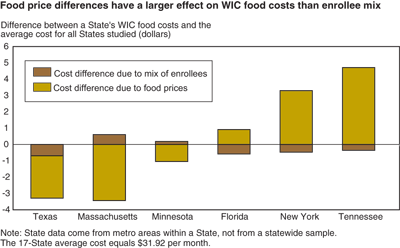Prices Dominate Interstate Variations in WIC Food Costs
- by David E. Davis
- 2/1/2005
The Special Supplemental Nutrition Program for Women, Infants, and Children (WIC) provides nutrition education, referrals to health care and other social services, and foods to supplement the diets of low-income pregnant and post-partum women, infants, and children up to age 5. WIC is the third largest Federal nutrition assistance program, trailing only the Food Stamp and the National School Lunch Programs.
WIC, which operates through a Federal/State/local partnership, is not an entitlement program. The number of participants that can be served each year depends on the annual appropriation and the cost of operating the program. Because food costs account for about 75 percent of total program expenditures, enacting policies to contain food costs allows States to reduce program expenditures. Understanding what drives WIC food costs helps States implement effective cost-reducing policies. A recent 17-State study by ERS found that variations in food prices between States usually play a much larger role than the different mix of participants, and that identical policies can affect costs differently across States.
The estimated average monthly food cost ranged from $28.64 per WIC participant in Texas to $36.27 in Tennessee; the average was $31.92 across all 17 surveyed States. Within a State, each group of WIC enrollees (women, infants, or children) qualifies for a different food package, containing different types and/or quantities of foods. These food packages differ in cost, so variation in overall food costs can arise as the mix of enrollees differs across States. Enrollees receive monthly vouchers for the items in their food package, which they exchange at approved WIC retailers. Retailers submit the vouchers to the WIC State agency for reimbursement at the retail price for the WIC items. So, variation in overall WIC food costs can also arise due to differences in retail prices for WIC items across States. For example, retail price differences accounted for WIC food benefits in Tennessee being an estimated $4.71 higher than the average for the States studied.
States frequently enact policies meant to reduce food costs, such as requiring participants to purchase only gallon containers of milk. Variation in WIC food costs may also result from differences in States' cost-containment policies. But, even savings from identical cost-containment practices differ across States.


